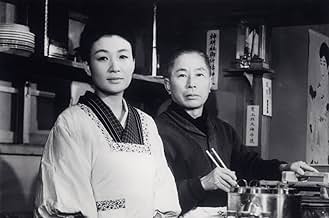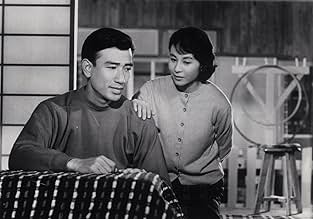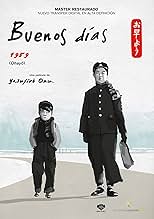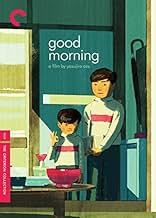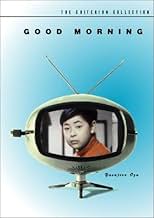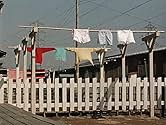AVALIAÇÃO DA IMDb
7,8/10
12 mil
SUA AVALIAÇÃO
Duas crianças iniciam uma greve de silêncio para pressionar seus pais a comprarem uma televisão.Duas crianças iniciam uma greve de silêncio para pressionar seus pais a comprarem uma televisão.Duas crianças iniciam uma greve de silêncio para pressionar seus pais a comprarem uma televisão.
- Direção
- Roteiristas
- Elenco e equipe completos
- Produção, bilheteria e muito mais no IMDbPro
Avaliações em destaque
Ozu's films always balance humour, heartbreak and social comment - in this film the balance is decidedly in favour of humour. Its hard to imagine a slighter story to build a full movie - two little boys who decide not to speak for a few days in a huff over being denied a TV. But Ozu builds a whole world out of this dull little suburb in a Japan just getting on its feet after the war and embracing consumerism as an alternative to..... well, whatever went before.
I think only Ozu could make boring mass produced housing look so utterly gorgeous in full colour, and the minor bickering of the household ladies seem so important. He's helped by a fantastic cast, especially the child actors playing the little boys (oddly enough, there doesn't seem to be any little girls in this suburb). The story has layer up layer of irony (aided by numerous fart jokes) built up upon its slight foundations making an utterly fascinating film. As usual with Ozu, he doesn't lecture, although as always his sympathy is slightly tilted to the somewhat bemused father figures. Even the simple ending, a shot of laundry fluttering on a line, seems somehow laden with meaning. The whole film is a pure delight.
I think only Ozu could make boring mass produced housing look so utterly gorgeous in full colour, and the minor bickering of the household ladies seem so important. He's helped by a fantastic cast, especially the child actors playing the little boys (oddly enough, there doesn't seem to be any little girls in this suburb). The story has layer up layer of irony (aided by numerous fart jokes) built up upon its slight foundations making an utterly fascinating film. As usual with Ozu, he doesn't lecture, although as always his sympathy is slightly tilted to the somewhat bemused father figures. Even the simple ending, a shot of laundry fluttering on a line, seems somehow laden with meaning. The whole film is a pure delight.
"Good Morning" (Japanese, 1959): Directed by Ozu. As in all of his films, Tokyo is the stage, and he populates them with his usual team of actors. Think of the professional stability of Ingmar Bergman, Woody Allen, or John Waters, but Japanese. Ozu concentrates on small moments made meaningful. Unlike the quiet, black and white drama "Tokyo Story", this later film (in color) is a gentle comedy about how people build the character of each and every day with the smallest of gestures which is this case is brought to our attention by two small brothers who decide to go "on strike" insisting that their Father get a television for the household. It's a loving, funny, and forgiving look at how silly we all can be.
While somewhat lighter than most of Ozu's features, this is still a rather perceptive film that is also entertaining to watch. The situation and the characters are all straightforward, yet Ozu's expert eye sees plenty of things worth considering, and each simple story development has a purpose. If the material remains generally lightweight when compared to some of his other movies, it still has the same thoughtful, low-key touch and genuinely human characters.
The young boys drive much of the story in this one, and they are very believable, whether in their petulant responses to parental authority or in their schoolboy fads. Some of the latter can be slightly off-putting at times, but then such things do rather ring true with the nature of boys at that stage of their lives.
The cast is quite large, so that none of the characters gets a lot more screen time than any of the others, yet somehow all of them not only come alive, but get some defining moments. Most of the adult characters are simple, yet easy to care about, and there are several good performances. The grandmother character and the aunt of the two brothers are probably the most interesting of the characters, yet all of them have a purpose.
As is usually the case with Ozu's movies, you can watch it a second time and see additional detail in the characters' relationships and dialogue. This time, the issues involved are not as significant as usual, yet the simple plot provides some insights into the ways that families and neighbors communicate with one another and understand one another. It's probably more entertaining than enlightening, but yet there is some substance as well.
The young boys drive much of the story in this one, and they are very believable, whether in their petulant responses to parental authority or in their schoolboy fads. Some of the latter can be slightly off-putting at times, but then such things do rather ring true with the nature of boys at that stage of their lives.
The cast is quite large, so that none of the characters gets a lot more screen time than any of the others, yet somehow all of them not only come alive, but get some defining moments. Most of the adult characters are simple, yet easy to care about, and there are several good performances. The grandmother character and the aunt of the two brothers are probably the most interesting of the characters, yet all of them have a purpose.
As is usually the case with Ozu's movies, you can watch it a second time and see additional detail in the characters' relationships and dialogue. This time, the issues involved are not as significant as usual, yet the simple plot provides some insights into the ways that families and neighbors communicate with one another and understand one another. It's probably more entertaining than enlightening, but yet there is some substance as well.
Ozu said he wanted to make a film about people's inability to express the important things, but natter on about unimportant gossip. This all comes out thanks to two boys that really want a TV. They enter into a vow of silence until their TV comes. This silence is misconstrued by the neighbours, who think their mother is angry at them. They begin to gossip amongst themselves and rumors soon start. Meanwhile, the young boys' aunt and teacher are attracted, but fail to act on their emotions. This is a lovely little film, filled with some great humor. Though, I must admit, there was a bit too much focus on the poo/farts jokes. The two boys, especially the youngest, are very cute and make their efforts to get a TV seem less brattish. It's really sweet to see how dedicated the parents are, and even though the kids are kind of mean, they do appreciate the gift in the end. There's no escaping Ozu's look at the clashes between old and new, with the TV looming over all procedures as something that will change life. A little gem, if not one of Ozu's classics.
For viewers who have seen only one or two of Ozu's statelier films -- say, "Tokyo Story" or "Equinox Flower" -- "Good Morning" will be a surprise. Two children take a vow of silence to coerce their parents into buying a television set: that's pretty much the whole plot. But what happens as a result affects almost every aspect of life in the nondescript, gossipy, elbow-to-elbow suburb in which the boys' family lives.
This is a comedy, and like all good comedies it's very serious. The boys' act of rebellion is very un-Japanese, and it threatens many of the politely ritualistic social behaviors that mask and deflect the tensions in Japanese society. Whole alliances among the village's women teeter and threaten to topple. The family's authority structure is upended, with the all-powerful father crumbling against the stubborn silence of two little boys.
What wins in the end is love -- or rather (Ozu must have found this particularly funny) love and television. The resolution will probably tear you up (it has brought moisture to the eyes of everyone I've seen it with) but it represents enormous changes in Japanese society -- the collapse of patriarchal authority, the invasion of foreign culture, and especially English-language culture, and the inexorable rise of that great leveler of aesthetics, television. Ozu saw the future, and he wasn't in it.
So naturally, he presents all this in a gentle, even sweet-natured comedy. There may be greater Ozu films, but it's hard to think of one I actually like more than "Good Morning."
This is a comedy, and like all good comedies it's very serious. The boys' act of rebellion is very un-Japanese, and it threatens many of the politely ritualistic social behaviors that mask and deflect the tensions in Japanese society. Whole alliances among the village's women teeter and threaten to topple. The family's authority structure is upended, with the all-powerful father crumbling against the stubborn silence of two little boys.
What wins in the end is love -- or rather (Ozu must have found this particularly funny) love and television. The resolution will probably tear you up (it has brought moisture to the eyes of everyone I've seen it with) but it represents enormous changes in Japanese society -- the collapse of patriarchal authority, the invasion of foreign culture, and especially English-language culture, and the inexorable rise of that great leveler of aesthetics, television. Ozu saw the future, and he wasn't in it.
So naturally, he presents all this in a gentle, even sweet-natured comedy. There may be greater Ozu films, but it's hard to think of one I actually like more than "Good Morning."
Você sabia?
- CuriosidadesYasujirô Ozu: [movie posters] Yasujirô Ozu pays tribute to his cinematic influences by putting all kinds of film posters all over the wall in his films. In this movie, there are two posters, one of Acorrentados (1958) (at 08:30) and one of Amantes (1958) (at 08:07), both at the neighbors' house.
- Versões alternativasThe original American theatrical release prints were in black and white.
- ConexõesFeatured in Transcendental Style and Flatulence (2017)
Principais escolhas
Faça login para avaliar e ver a lista de recomendações personalizadas
- How long is Good Morning?Fornecido pela Alexa
Detalhes
Contribua para esta página
Sugerir uma alteração ou adicionar conteúdo ausente




